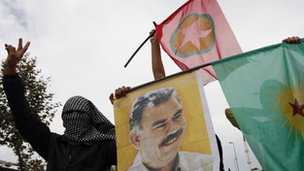
The military leader of the Kurdistan Workers’ Party (PKK), Murat Karayilan, has said fighters will begin to withdraw from Turkey in early May.
“The withdrawal is planned in phases… and will be completed as soon as possible,” he said at a news briefing.
It follows a call by jailed PKK leader Abdullah Ocalan for a ceasefire, as part of peace negotiations with Ankara.
More than 40,000 people have died in the 30-year fight for an ethnic Kurdish homeland in Turkey’s south-east.
Mr Karayilan announced the withdrawal to journalists gathered at a PKK base in the stronghold of the Kandil mountains in northern Iraq.
Analysis
 Cagil KasapogluBBC Turkish
Cagil KasapogluBBC TurkishThis follows months of negotiations between the Turkish government and the PKK’s imprisoned leader Abdullah Ocalan. Ocalan has said that “the weapons should be silent and ideas should speak”.
Unlike previously, the AKP government seems to be more determined to solve the problem through negotiations. It has not kept the negotiation process secret and chose to declare its desire for a permanent solution.
However, the main opposition CHP party remains critical and claims that the process lacks transparency.
Abdullah Ocalan and PM Erdogan are the two key figures in this peace process. Recent developments indicate that Ocalan remains as the most respected and powerful actor among the Kurds.
But he warned: “Withdrawal will stop immediately if there is any attack, operation or bombing of our guerrilla forces, and our forces will use their right to reciprocate.”
In his statement – a copy of which was seen by BBC Turkish – Mr Karayilan proposed a three-stage plan to settle the decades-old conflict:
- Gradual withdrawal of PKK forces from Turkish soil
- Constitutional amendments made by Turkish government
- PKK completely lays down arms once Ocalan and other Kurdish militants released from prison
More than 50 journalists from Turkish and foreign media outlets were taken from the regional capital, Irbil, to the briefing and had their mobile phones confiscated. No television crews were given access.
‘Decision-maker’
Ocalan called for a truce in March, saying the PKK was “moving from armed resistance to an era of democratic political struggle”.
The PKK

- The PKK took up arms against the Turkish state in 1984, demanding greater autonomy for Turkey’s Kurds, who are thought to comprise up to 20% of the population
- Since then, some 40,000 people have died in the conflict
- It is regarded by Turkey, the US and European Union as a terrorist organisation because of its attacks on Turkish security forces and civilians
- PKK fighters face life after withdrawal
- Profile: The PKK
- Ocalan statement: Key excerpts
The move was cautiously welcomed by Turkish Prime Minister Recep Tayyip Erdogan.
The PKK has announced ceasefires before and each has failed.
However, this time there is a sense of optimism among many in Turkey, says the BBC’s James Reynolds, reporting from the PKK media briefing in northern Iraq.
The Turkish parliament is currently discussing a new constitution, with the Turkish and Kurdish leaders seeking to renegotiate the foundation of the secular state drawn up by Mustafa Kemal Ataturk in the 1920s.
The PKK wants greater autonomy for Turkey’s Kurds, who are thought to comprise up to 20% of the population.
The group is regarded by Turkey, the US and European Union as a terrorist organisation, because of its attacks on Turkish security forces and civilians.
The organisation rolled back on its demands for an independent Kurdish state in the 1990s, calling instead for more autonomy.
Our correspondent says Ocalan is still the final decision-maker among the Kurds, despite the 14 years he has spent in Turkish custody. He is serving a life sentence for treason.
https://www.bbc.co.uk/news/world-europe-22293966